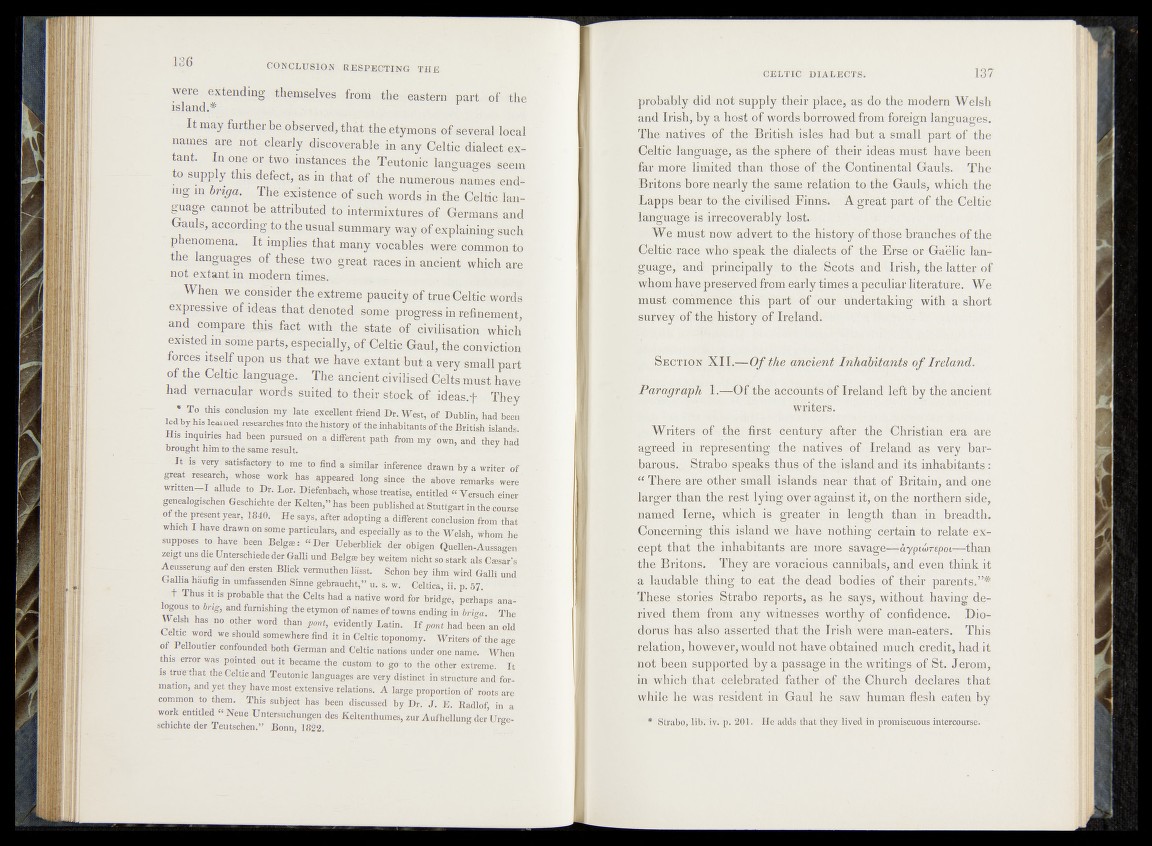
were extending themselves, froiM the./eastern part of the
island.*
It may further be observed, that the etymons of several local
names are not clearly discoverable in any Celtic dialect'exta
n t Inone qr two. Instances the Teutonic language^ vseem
to supply this defect, as in that of the numerous names end-
mg in briga. The e^istericehf such words'^ the Celtic language,
cannot be attributed tplintermixtures.of »Germans and
Gauls, according to the usual summary way of explaining such
^ phenomena. It impljes that many v o c a b l^w ^ e f common to
the languages of these two great races in ancient which are
n o t extant in modern tirnos.;
When we consider th.e extreme paucity of true Cefewpitfs
expressive of ideas that denoted some .progress in,refinement,
and compare. Jh is fact with the state of civilisation which
existed*in,some parts, especially, of ;Celtic Gaul, the conviction
forces itself upon us that we .have extanthufeai very small part
of the CeltioTanguage. The ancient civilised C e l f ^ S lh a v e
had vernacular words suited to their.stock-of id ia s.f They
-* To -ih l8 -concl^M® my late excellent friend Dr. West, of rDnblih-had been
led I^lmlearnedresearches into thehistory of the inhabitants of the British islands.
Hk mquiries had been pursued on a "different path from my' own, and theV^had
h rd n ^ th n nW the Same result. " ' ’ -I *- *. ;
-It w_very^: satisfactory to me ta ^m U similar inference drawn b y a ' o f
grrat research,.whose work has s p e a re d long since the above remarks were
- wntten-r-I allude to Dr; Lor. JMefeahach, .whose treatise, entitled,« Versuch einer>
genealogischen Geschichte der Kelten,” has been puhUshedat'slut^rt in theJouxse
ofthe present year, 1840. He says, after adopting a different c o n d M M that
whidi I have drawn on some particulars, and especially as to the W e fe 'M o flv h e
supposes to-have been Bdgse : “ Der UeberWick der ojhigen Quellen-Aussagen
zeigt uns die Unterschiede derGalli und Belga bey weitem nicht so stark als Casar’e
aU/-deB ^ fflW M Schon bey ihmwird Galli und J
Gallia haufig in umfassenden Sinne gebraucht,” u. s. w. Ceitica, ii. p’. 57.
t Thus it is probable that the Celts had a native word for bridge, perhaps ana-
w y f to @11 ^ ^ ^ h i n g the etymon of-names of towns ending in b r ig a . The
Welsh has no other word than p o n t ^ evidently Latin. I f p e n t had been an old
Celtic word we should somewhere find it in C elle toponomy. Writers of the age
of Pelloatier confounded both German and'Celtic'nations under ope name. When
this error was pointed out it became the custom to go to the other extreme. I t
is true'that the Celtic and Teutonic languages are very distinct in structure and for-
mation, and yet they have most extensive relations. A large proportion of roots are
commopLJo them. This subject'has been discussed" by Dr. ƒ. E. Badlof in a
work entitled “ Neue Untersuchimgen des Keltenthumes, zur Aufhellung der Urge-
scbichte der Teutschen.” Bonn, 1822.
probably did not supply their places as do the modern Welsh
and Irish, by a hqst-of words borrowed from foreign languages.
The natives of the British' is;tesr had.but a small part of the
Celtic-fangua^e, as th ensphere of their ideas must have been
far more,.-lfmited than those of the Continental Gauls. The
Britons bote'ne'arly the same .refalldn, to the Gauls, which, the
Lapps bear to the-civilised' Finns. A great part of the Celtic
language iS''irrecoverably loUtte -
v WUiUtusfc'ipow'-advert to the historytef those branches of the
Celtic race who- speak the diu|Mts .of -the Erse or Gaelic language,
and’1 principally to th e “^dp|Mand Irish,, the latter of
wham h^ve presprved from early times^peculiar literature. We
must commepse this part of our undertaking with a short
.survey of the history of Ireland.
l .Sectkin X I I .— Of the ancient Inhabitants o f Ireland.
Paragraph 1.—Of the accounts 6f Ireland left by the ancient
7 writers.
i; * Writers '®-, th,e- fir^ t. century1) after the Christian era are
agreed in repm^ijjting the natives ,of Ireland as very .bar-
fl&iousv^ Strabo speaks th ^q f^ th e. island anjjyits, inhabitants:
5f 'b h ^ ^ re ,o th e r small islands near,that of Britain, and one
larger^tham tbd$r eij lying'4ver against i%on]^he .northern side,
-named Ierne, which, is\grea,tei\i in length'^than in Jbrqadtlu
l^i^ceroing .this !^^|jJ^exha^lDQthinffi{ certain to relate excep
t tbatqthe inhabitants are'more savage-^ayptwrepoi—than
Britons. They are voraciods Cannibals, and, even think it
a laudable, thing to eat, the dead bodies,'qf their pstrents.”*
These stqriqSLg^.trab$jijreports, Ss&he .sayS, without having derived
them from any* witnesfsbs-worthy of confidence Dio-
dorus has'also asserted that the Irish were man-eaters. This
relation, however, would npt hav^o|^a^ed sn ii^ iJN.crq(dib had it
not been supported by a passage in the,writings^4f|St. Jerom,
in which that celebrated*fathl^bfithe;Church’ declares that
while hb'%as resident in GatiPhe isa/v human flesh eaten by
Strabo, lib. iv. p. 201. He adds that they lived in promiscuous intercourse.